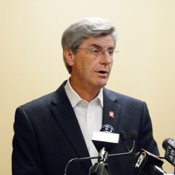Officials say Mississippi would be ready if a Category 3 hurricane was headed toward the Mississippi Gulf Coast and due to make landfall in 18 hours.
To help prepare the state for the Atlantic hurricane season, which starts today, several state agencies participated in a mock exercise called "Hurricane Natasha" May 30.
"As a state, we are ready to respond," Mississippi Emergency Management Agency Director Robert Latham said at a press conference Wednesday. He led the exercise, which had been planned since February. Mississippi Department of Public Safety Commissioner Albert Santa Cruz, Adjutant General of Mississippi's armed forces Leon Collins and Gov. Phil Bryant also took part.
"We went through the procedures that are necessary to manage that type of disaster," Bryant said. The mock exercise allowed officials to examine the effectiveness of current procedures.
"(We) were able to communicate with each of the emergency management coordinators at all counties, receive specific information regarding the evacuation of all citizens in low-lying areas, and assist the local emergency management personnel with supplies, manpower and materials needed," Bryant said.
Latham acknowledged that many on the emergency team were new to their positions. The simulation gave them an opportunity to address and discuss their capabilities and inabilities.
"We hope to make certain that we, in times of disaster, have a unified command," Bryant said. Newly appointed Collins added that he could move about 7,500 airmen to hurricane-damaged areas if necessary.
Bryant and state agency representatives also challenged citizens to be ready for severe summer storms as well. "One of the things that we are trying to emphasize is that individuals must be prepared in the event of a hurricane or a tornado," Bryant said. "We are asking all to be careful, to be aware that your preparedness is, in fact, your first responsibility, and that would include having your emergency supply kit available in your home."
A typical emergency supply kit should include flashlights, batteries, a radio, non-perishable food items, bottled water, first aid kits, blankets and towels.
Latham also urged citizens to change the conversation about their preparedness for hurricane season.
"When we can start getting families and communities that are prepared to do the things they should do, we can change the outcome of disasters," he said.



Comments
Use the comment form below to begin a discussion about this content.